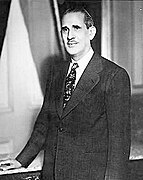
Carlos Prío Socarrás was the President of Cuba from 1948 until he was deposed by a military coup led by Fulgencio Batista on March 10, 1952, three months before new elections were to be held. He was the first president of Cuba to be born in an independent Cuba and the last to gain his post through universal, contested elections. He is sometimes called Charles Prio Socarras in English.

Liquore Galliano L'Autentico, known more commonly as Galliano, is a sweet herbal liqueur, created in 1896 by Italian distiller and brandy producer Arturo Vaccari of Livorno, Tuscany and named after Giuseppe Galliano, an Italian hero of the First Italo-Ethiopian War.
The Autonomist Liberal Party, renamed usually semplified in Liberal Party in 1898, was one of major parties from 1910 until the Cuban Revolution the late 1950s, when it was exiled.

The Authentic Radical Liberal Party is a centrist liberal political party in Paraguay. The party is a full member of Liberal International. The liberales, as they are known, are the leading opposition to the dominant conservative Colorado Party. They have taken this position since the end of the Alfredo Stroessner dictatorship in 1989. They are the political successors of the Liberal Party.
This article gives an overview of liberalism and radicalism in Paraguay. It is limited to liberal and radical parties with substantial support, mainly proved by having had a representation in parliament. The sign ⇒ means a reference to another party in that scheme. For inclusion in this scheme it isn't necessary so that parties labeled themselves as a liberal party.

Dr. Ramón Grau San Martín was a Cuban physician and President of Cuba. He was the last president other than an interim president, Carlos Manuel Piedra, to be born during Spanish rule. He is sometimes called Raymond Grau San Martin in English.

The Authentic Party of the Mexican Revolution was a Mexican political party that existed from 1955 to 2000. PARM was generally considered a satellite party of the governing Institutional Revolutionary Party (PRI).
Authentic Integral Development was a political party in Guatemala. At the 2003 Guatemalan general election, held on 9 November 2003, the party won 3.0% of the popular vote and 1 out of 158 seats in Congress. Its presidential candidate Eduardo Suger Cofiño won 2.2% in the presidential elections of the same day.

The Authentic Costeño Autonomy Movement is a regional Nicaraguan political party founded in 1993 by Faran Dometz Hebbert, a Moravian pastor from Pearl Lagoon and former director of the Moravian High School in Bluefields. MAAC represents the Creole establishment. The MAAC contested in the 1994 Atlantic Coast Regional Elections and won 2 seats in the RAAS Regional Council.

The Popular Socialist Party was a communist party in Cuba. Originally called the Communist Party of Cuba, it was formed in 1925 by a group including Blas Roca, Anibal Escalante, Fabio Grobart, Alfonso Bernal del Riesgo and Julio Antonio Mella, who acted as its leader until his assassination in Mexico in 1929. It was later renamed the "Communist Revolutionary Union". After the electoral victory of the Partido Auténtico in the 1944 elections, the party went into decline, and eventually adopted the name "Popular Socialist Party" for electoral reasons.

General elections were held in Cuba on 14 July 1940. Fulgencio Batista won the presidential election running under the People's Socialist Coalition banner, whilst the Partido Auténtico emerged as the largest party in the House of Representatives. Voter turnout was 73.4%.

General elections were held in Cuba on 3 November 1958. The three major presidential candidates were Carlos Márquez-Sterling of the Partido del Pueblo Libre, Ramón Grau of the Partido Auténtico and Andrés Rivero Agüero of the Coalición Progresista Nacional. There was also a minor party candidate on the ballot, Alberto Salas Amaro for the Union Cubana party. Voter turnout was estimated at about 50% of eligible voters. However, he was unable to take office due to the Cuban Revolution.

General elections were held in Cuba on 1 June 1948. Carlos Prío Socarrás won the presidential election running under the Auténtico-Republican Alliance banner, whilst the Partido Auténtico emerged as the largest party in the House of Representatives, winning 29 of the 70 seats. Voter turnout was 78.7%.

Parliamentary elections were held in Cuba on 1 June 1946. The Partido Auténtico emerged as the largest party, with 30 of the 66 seats in the House of Representatives.

Parliamentary elections were held in Cuba on 1 June 1950. The Partido Auténtico-Democratic Party-Liberal Party alliance won 42 of the 66 seats. It was the last free election held in Cuba on a national level.

The 2008 New Progressive Party primaries were the primary elections by which voters of the New Progressive Party (PNP) chose its nominees for various political offices of Puerto Rico, namely the position of Governor, for the 2008 general elections. Resident Commissioner Luis Fortuño was selected as the nominee at the primary elections held on March 9, 2008. He would go on to win the 2008 general election as well.
The LIV Legislature of the Congress of the Union met from September 1, 1988, to August 31, 1991.














